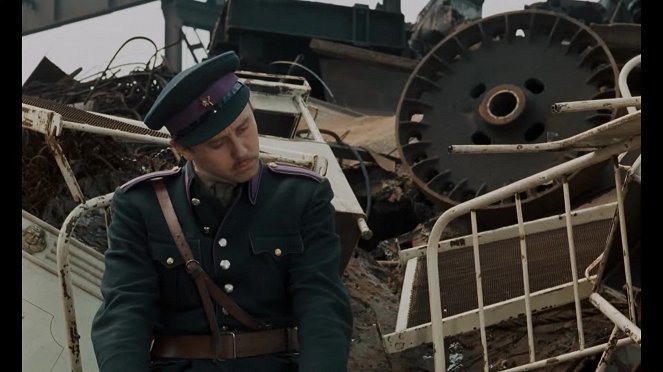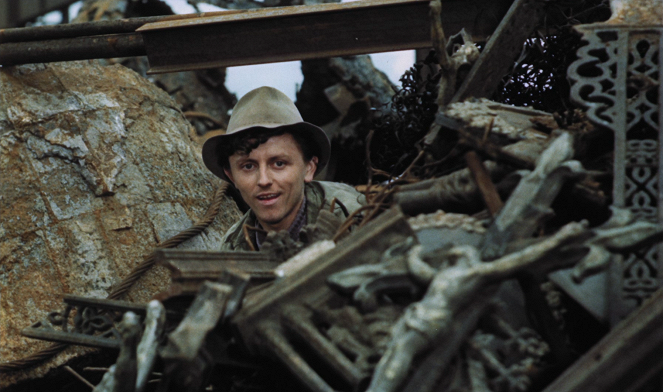Reżyseria:
Jiří MenzelZdjęcia:
Jaromír ŠofrMuzyka:
Jiří ŠustObsada:
Rudolf Hrušínský, Vlastimil Brodský, Václav Neckář, Jitka Zelenohorská, Jaroslav Satoranský, Vladimír Šmeral, Ferdinand Krůta, František Řehák (więcej)Opisy(1)
Skowronki na uwięzi to adaptacja opowiadania Bohumila Hrabala. Film powstał w 1969 roku i od razu na ponad 20 lat trafił na półkę. Oficjalna premiera filmu miała miejsce dopiero w 1990 roku na festiwalu w Berlinie, gdzie uhonorowano je Złotym Niedźwiedziem. Film opowiada o codziennym życiu robotników huty w Kladnie. Na skutek reedukacji w latach 50-tych członkowie drobnej burżuazji zostali zmuszeni do pracy w składowisku złomu. Ich wspólną cechą jest skłonność do indywidualizmu, który nie jest godny obywatela socjalistycznego kraju. Dlatego zostali oni poddani rygorowi komunistycznego reżimu. Film jest pasmem paradoksalnych, a często groteskowych sytuacji. Humor pomieszany z powagą, nadzieją z beznadzieją tworzą groteskowy obraz reżimu, ale jednocześnie pełen optymizmu i wiary. (Kino Świat)
(więcej)Materiały wideo (3)
Recenzje (6)
I did not experience that period, I do not feel the chills in historical situations, and surely many connections will escape me. But I simply do not believe in the optics of rose-colored glasses shown through forced warm dialogues in bad conditions and sudden infatuation without reflection on the future. Menzel's clumsiness, emphasized by the gaping naivety of Neckář and the babbling female cast, is a combination that is currently wearing me down to the point that any funny situations or pleasantly absurd lines get lost in the mess around.
()
Postřižiny (The Cutting Hedge) or Slavnosti sněženek (The Snowdrop Festivities) are indeed very popular and understandable, however, I consider Skřivánky na niti (Larks on a String) and Ostře sledované vlaky (Closely Watched Trains) as the culmination of Hrabal's text and Menzel's imagery. This is no longer just relaxed humor, but a deep exploration into the thinking and behavior of the people of their time presented with knowledge of the subject matter and in a very engaging way for the viewers. Yes, it is amusing, but it sends shivers down your spine. The only brief appearance of Věra Galatíková as a seasoned comrade can say more about the tragedy of the era than boring hours of history lessons or lectures by historians. A lot of witty lines, exceptionally strong cast, and a peculiar melancholic poetry make this film an attractive spectacle. Clever filmmaking, when Menzel with just one shot of a heap of scrap creates a mood and emotions that would require several minutes for another filmmaker. For me, one of the peaks of our cinematography. Overall impression: 100%.
()
The confession of Bohumil Hrabal about subversive activities in the communist state has precisesly that decent or even mythical humor you get when you watch any Hrabal-inspired movie directed by Jiří Menzel. Larks on a String aren’t any worse than for example Cutting It Short or The Snowdrop Festival. I like The Snowdrop Festival the best only because the forest locations in Kersko are a tad more pleasant than the steelworks in Poldi, Kladno.
()
Quite symbolically, Menzel's film ends with a long shot of the descent into the darkness underground – because that was its destiny for years to come. One of the last examples of free cinema of the 1960s now gives off a raw and unchained impression – different image quality, sharp cuts, flaws in the image, all reminiscent of the forced oblivion that caught up to Larks on a String. The creative method chosen by the screenwriter Menzel-Hrabal duo is also raw. A harsh poem in film prose, where the lyrical part is provided by the dismal camera runs on the panorama of the steel kingdom of the beautiful Poldi, the epic one with fragmented and strongly stylized dialogues. Larks on a String is a unique narrative affair that says little about its actors, the main speech amounts to the magnificent acting of all involved, and then the deliberately uncommented absurdity that Hrabal and Menzel sophisticatedly put into a provocative mosaic. It does not complain and pathetize, but in the style of the New Wave it documents and reveals the true form of things, their essence, it casts into the world the terrifying absurdity of the 1950s in all its sheer nakedness. We find a parallel with Hrabal's poetry (Krásná Poldi) and prose (Inzerát na dům, ve kterém už nechci bydlet), but also with the complaining narrative neutrality of the novelist Josef Jedlička (“Kde život náš je v půli se svou poutí"). The symbolic world of the scrap yard, which mirrors its times, is an obvious metaphor for transforming man into amorphous blocks of scrap, excellently captured characters in turn corresponding to the sample of society after a class battle... One of the best testimonies about a cursed time, which requires an attentively perceptive viewer. I guess that's why it's never going to become a generally accepted classic.
()
Together with Kachyna’s The Ear, for me one of the best films dealing with the morally warped time of the 1950s, full of ideological bullshit, fear of repression, informers, and enthusiastic builders, begging in letters for the harshest punishment for Milada Horáková. And Jiří Menzel, hand in hand with Hrabal's source material, is unique. While most of our recent post-revolutionary films have tried to approach the unfortunate period of the 1950s through "big fatal" dramas, where they push hard enough to make a boulder shed a tear, Menzel makes do with beautiful poetic narrative, where he even pulls out the stops to portray the oppressive atmosphere of the time, with hints, a slight melancholy, the would-be humanist bullshit of a apparatchik (a brilliant Hrušinský) and a mere shot of a State Security car waiting for its "prey" outside a factory entrance. And the shots of endless rows of ingots and piles of sheet metal and iron junk give it a snazzy period atmosphere.
()



Reklama